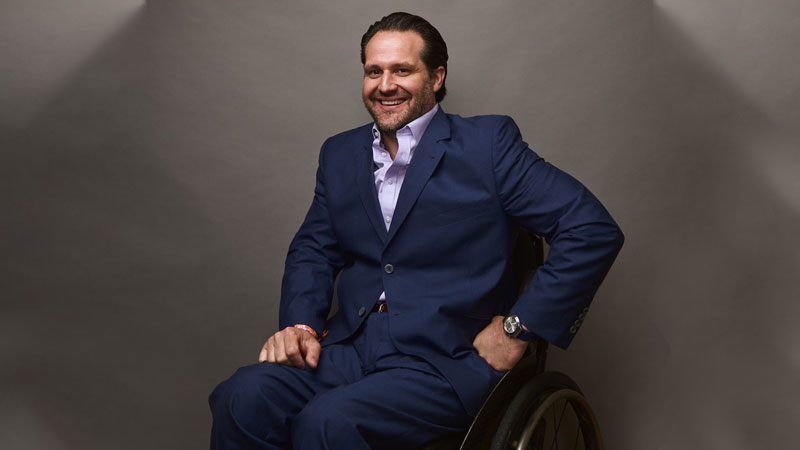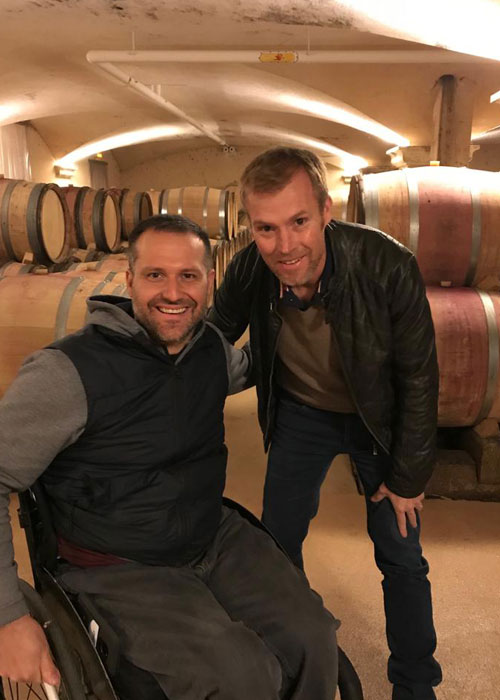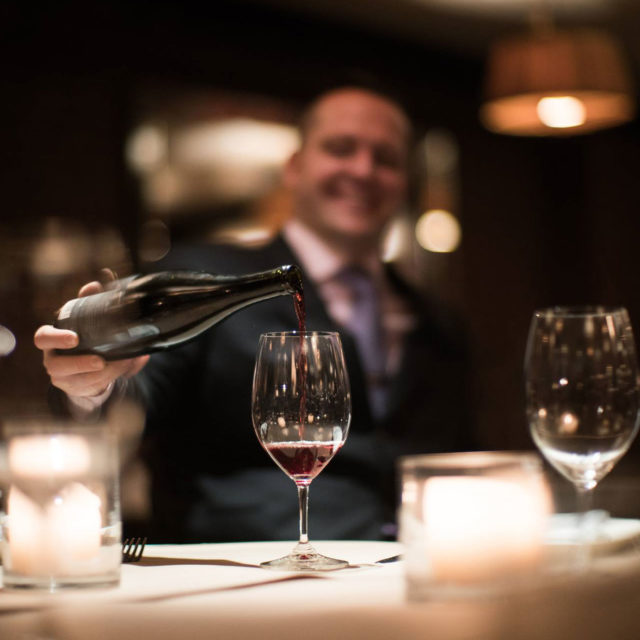“I remember when I started working in restaurants, people would say, ‘Oh, I’ve never been served by a guy in a wheelchair,’” Yannick Benjamin says.
Benjamin was in a car accident and paralyzed from the waist down in 2003. An Advanced Sommelier with the Court of Sommeliers, he’s worked at NYC fine dining restaurants Jean-Georges, Le Cirque, and Oceana, and is currently head sommelier at Manhattan’s University Club.
“I hope that, one day, it becomes just as normal as being served wine by someone who is able-bodied,” he adds.

Title III of the Americans with Disabilities Act requires such public-facing businesses as bars and restaurants to be accessible to people with disabilities. The law is inconsistently enforced, however, and many bars and restaurants are extraordinarily difficult for disabled folks to navigate. Entrances might be up short flights of stairs, or bathroom stalls too small to fit a wheelchair inside.
How pervasive is this problem? On May 22, 2019, Washington Post food critic Tom Sietsema said he will start including accessibility information in his restaurant reviews — otherwise, D.C. diners who are disabled or have limited mobility have no way of knowing what they’re in for when they go out to eat.
“Typically, the hostess stand has been designed specifically for non-wheelchair users, which means I’m way too short to speak comfortably with the host or hostess,” Ace Ratcliff, who uses a wheelchair, writes in Eater.
Nineteen percent of the U.S. population is disabled, so some 56.7 million Americans can’t reliably look their host or hostess in the eye. These figures are startling, especially when you consider restaurants are in the hospitality business. Retrofitting bathrooms and foyers is expensive, but so is alienating entire swaths of the population. (There’s also basic decency to consider, but, unfortunately, that doesn’t always inspire company budgets.)
Inclusion is important to Benjamin. He’s the co-founder and director of development of Wheeling Forward, a nonprofit organization that supports newly disabled people. Its hospitality-focused offshoot, Wine on Wheels, raises capital and awareness for disabled people in the wine industry.
In April 2019, Wine on Wheels organized a panel discussion on diversity and inclusion moderated by Jackie Summers, writer and owner of Jack from Brooklyn Sorel Artisanal Liqueur.
“Yannick is an incredible human being,” Summers says. “He wants to make sure other people have the ability, the resources, and the support to do what he does. That’s what makes him spectacular. He’s not just doing this for himself. He’s making sure other people can do it, too.”

The panel discussed racism, sexism, homophobia, ableism, ageism, and pretty much every other way identity politics intersect with hospitality professionals’ work.
The conversation about ageism resonated with Benjamin. “You go to restaurants, and I can’t even tell you, it’s very rare that I get served by or meet someone working who’s over the age of 50. That’s something that, going forward, I want to focus on as well,” he says.
Still, he’s quick to note that tokenism is not the solution to the lack of diversity in bars and restaurants. If he had his own restaurant, he says, he would happily hire candidates over 50 years old if they were qualified and capable, not to prove a point about inclusion.
“I don’t want to be hired because, ‘Oh yeah, let’s hire Yannick Benjamin because we need a guy in a wheelchair, it will be a great look for us,’” he says. “I’m hoping when they hire me … it’s based on merit, because I have experience, because I really want the job, and they think I offer a lot of value.”
Like many of us, Benjamin has gone on a job interview and immediately sensed he wasn’t going to be offered the position. Some interviewers couldn’t figure out how a sommelier could do their work in a wheelchair, he recalls. Instead of asking him about it, they simply silently eliminated him from the running.
“No one should ever be forced to hire anyone they don’t want to hire. No one is saying that,” Benjamin notes. There’s a near-constant need for staff in the restaurant business, however; so companies looking for talent would benefit from identifying qualified applicants’ strengths.
Benjamin, for example, created a custom table that he attaches to his chair to use during service in restaurants, and can easily demonstrate how he does his job to interested interviewers. “At the very least, everyone should have some kind of strategic plan to give each and every single [applicant] an opportunity to present themselves,” he says.
Jermaine Stone, president and CEO of Cru Luv Selections, says Benjamin “has so much foresight and empathy, and a genuine drive to change the game and help people.” Stone participated in the Wine on Wheels panel Benjamin organized in NYC in April. “He’s so well-respected because he just constantly pays it forward,” Stone says of Benjamin’s impact on the industry.

A few days after I attended that Wine on Wheels panel and began reporting this story, I wanted to invite Benjamin to an industry event. I called the venue first to ask if it was wheelchair accessible, and, in doing so, mistakenly gave the receptionist the impression that I use a wheelchair. In an instant, her telephone demeanor changed.
“Ohhh, yes!” she cooed. “There’s an elevator! And a ramp you can use! Absolutely!” This information was useful, and I was glad the venue was indeed wheelchair accessible. Still, I was jarred by how suddenly her tone went from professional detachment to something reminiscent of the one I use with my young nieces and nephews.
I didn’t tell Benjamin about this interaction, but it stuck with me. “Do I think that people are not trying to be open-minded about having more diversity in restaurants and wine?” he asked on a call a few weeks later. “I don’t think that’s the case. I think there’s a lack of mentorship and I think there’s a lack of self-awareness.”
The secret to creating a more equitable industry — and society — is not implementing hiring policies or quotas. It’s recognizing capabilities outside of our own conventions. It’s being open to what other people can bring to the literal or metaphorical table. It’s getting comfortable with being different, and having the confidence to reconsider what hospitality actually means.
